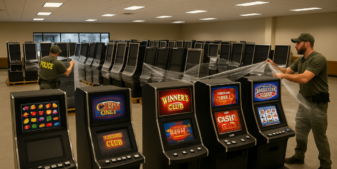An illegal gambling network was shut down in Pennsylvania, with police seizing hundreds of unregulated betting machines.
The Pennsylvania Office of Attorney General said over 400 illegal gambling devices were taken from bars, gas stations, and convenience stores across the western part of the state, effectively shutting down a criminal gaming network.
“These devices were essentially slot machines dressed up as skill games,” Attorney General Dave Sunday said in a press release. “I commend our partners at the Pennsylvania State Police for helping disband a large-scale operation that netted a tremendous amount of illegal gambling profits.”
Two companies, Buffalo Skill Games, Inc., and J.J. Amusement, Inc., are being prosecuted in the case. Both companies are owned by John F. Conley, who has previously been convicted on federal gambling charges.
Pennsylvania gambling industry
Pennsylvania online casinos are legal and generated $2.8 billion last year, but the illegal casino sector is estimated to have generated $2.2 billion. Retail casinos that are allowed to offer players slot games are taxed at a high rate of 54%, so any operators flaunting tax laws are targets for state regulators.
Estimates suggest tens of thousands of unregulated “skill games” exist across the state. Devices marketed as “skill games” have been at the center of ongoing legal debates in PA and other states, challenging the definition of gambling under state law. Current laws require a license for slots, but skill games are exempt from gambling taxes and regulation.
Gov. Josh Shapiro wanted to tax skill games last year and called for a levy of 42%, which he believed would bring in an additional $150 million in tax revenue per year. Efforts to pass legislation stalled, however.
The games can be found across the state’s restaurants, bars, and convenience stores, and business owners see the machines as an essential source of income.
Sen. Gene Yaw, whose district includes a skill games manufacturer, said, “Skill games are designed to provide supplemental income to businesses. They are important to these establishments for one very unique reason — they must be played in person, on-premises.”
Yaw also said the proposed tax rate was too high and called for a rate of 16%, far lower than that suggested by Shapiro.
Expansion of legal gambling
Pennsylvania expanded online poker recently by joining the multi-state internet gaming agreement. Players can now play online with users from New Jersey, Delaware, Michigan, Nevada, New Jersey, and West Virginia. This leads to bigger jackpots and better bonuses for poker players.
Sports betting is also going strong in the state, with over $700 million generated in revenue last year. March saw a record betting handle of $842 million, which led to Pennsylvania sports betting companies generating $27 million. Of this, $25.6 million was from online wagering.
The state is therefore keen to protect the flow of taxes from gambling, and there will no doubt be more discussions on how to address the spread of illegal gaming machines following this case.

